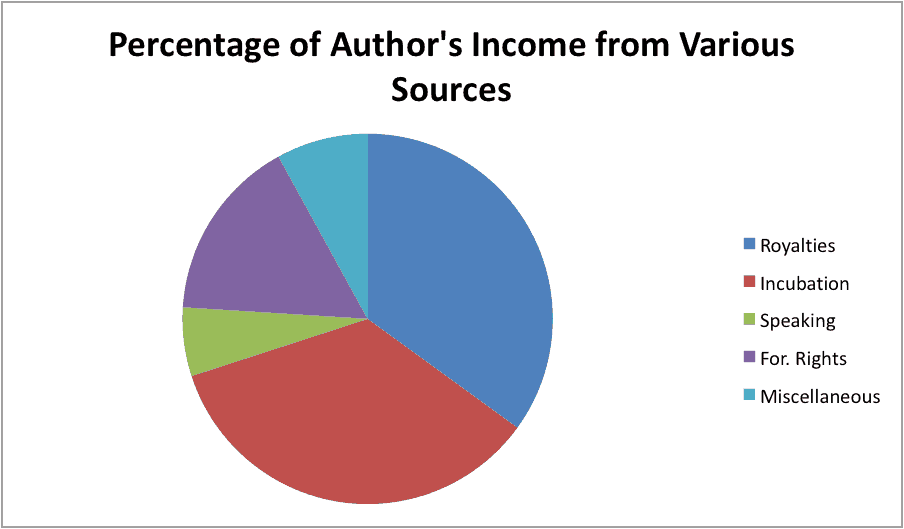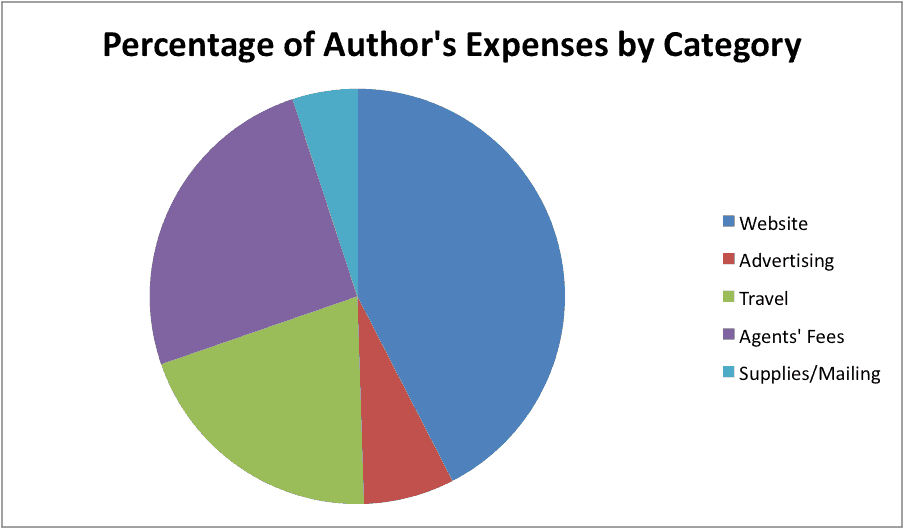I would almost rather parade naked down the street than write this author salary article. (Thirty years ago, when the bod was better, I probably would have opted for the naked thing if given a choice between that and writing this post.)
There are three things we don’t talk about in polite society—religion, sex, and money.
Well, I’m about to break the taboo and bare it all about money, specifically how much money one author (moi) makes. Other authors make more, many make less, and they come by it in different ways, but I’m willing to be transparent about my income from 2017 in an effort to help those who are breaking into the publishing world better understand the money situation.
No such thing as an author salary
The word “salary” connotes a regular source of income paid by an employer. This is not the nature of a writer’s income. There is nothing regular about it—an author’s money comes from advances (sometimes split into three installments—upon contract signing, delivery of the manuscript and book publication), royalties that accrue after the book goes on sale and the advance is earned out, and miscellaneous other sources depending on whether a writer self-publishes, gets paid for teaching/speaking, ghostwrites, or has any one of a number of other income streams. Additionally, there is no author salary because there is no one “employer”; rather, an author’s money comes from myriad sources. (Note: if you don’t understand terms like “advance” and “royalty,” go read Dana’s article on book contract terms.)
One author’s income
So, eschewing the term novelist’s salary, let’s look at the money I made in 2017 that came from writing-related sources.
The bottom line: I made a shade over $30,000 in 2017.
 That money came from a variety of places. Approximately one-third of it came from royalties earned from my 18 traditionally published books. Approximately another third came from money earned from my self-pubbed Incubation Trilogy. The bulk of the remaining monies came from speaking/teaching engagements, copyediting, audiobooks, and foreign rights sales. It’s important to note that I did NOT sign a new book contract in 2017, so there are no advance payments in this figure. (For the record, advances are where you see the biggest chunks of money as an author.)
That money came from a variety of places. Approximately one-third of it came from royalties earned from my 18 traditionally published books. Approximately another third came from money earned from my self-pubbed Incubation Trilogy. The bulk of the remaining monies came from speaking/teaching engagements, copyediting, audiobooks, and foreign rights sales. It’s important to note that I did NOT sign a new book contract in 2017, so there are no advance payments in this figure. (For the record, advances are where you see the biggest chunks of money as an author.)
I can hear you saying, “Hm, $30K is a decent income. Not ‘buy a yacht’ money, but reasonable for working at something I’m passionate about.”
Not so fast.
An author’s annual expenses
Let’s look at my expenses. They totaled roughly $17,000. By far the biggest single chunk of that ($7100, give or take) was for my website and online marketing—hosting, design, updating, maintenance, promotion, mailing list, etc. The second biggest chunk went to agents’ fees, and the third biggest to travel. I also spent in the neighborhood of $500 on advertising/giveaways, and the rest on office supplies and miscellaneous professional expenses (like fees for belonging to professional organizations, books, etc.).
 Typical author’s income
Typical author’s income
I’m not sure there is any such thing as a “typical author,” salary aside. (Read Paula’s post for another take on how much authors really make.) You have outliers like James Patterson or JK Rowling who skew the average by raking in bazillions of dollars annually, but your chances are better of winning the lottery than of selling like one of those phenoms. A certain contingent of authors exists in the mid-list range, making enough to be profitable but not enough to call themselves rich; many (maybe most) don’t make enough to quit their day jobs unless they have another income stream (for me, it’s my military retirement checks). The vast majority of would-be career authors earn less than $10,000 annually.
The takeaway
So, what should the budding career author take away from this baring of my financial soul? I think the most important point is that if you want to make a living as an author these days, to create your own “author salary,” you are wise to develop a variety of income streams: traditional publishing, self-publishing, writing articles or short stories, teaching/speaking, copywriting, editing, and other writerly pursuits. Your author salary is what you make it, and career authors recognize that making a living writing usually means penning more than just novels.
C’mon over to our Facebook page to discuss author’s incomes. Do these numbers surprise you at all? Are authors’ efforts undervalued in the marketplace? How could more of us make a living wage?





